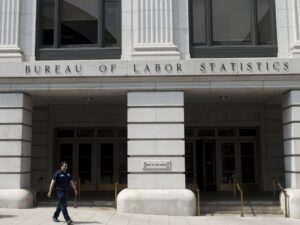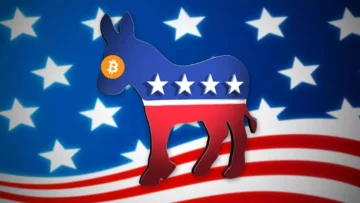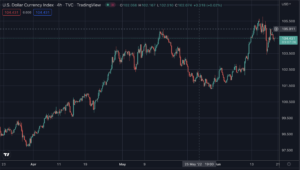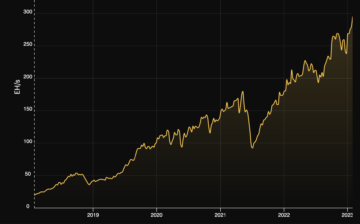“We sound woefully unprepared for the storm ahead,” an editorial in South Africa’s Mail and Guardian says while criticizing the statement of Defence Minister, Thandi Modise, as petulant.
In response to allegations South Africa is supplying ammunition to Russia in a war that South Africa claims is unaligned, the minister said:
“I’m tired because every time we have to be told about the US. Everybody now sees the spook called South Africa. I can tell you that categorically, we did not send fokol, not even a piece of Chappies [bubblegum] to Russia. We should be left alone.”
The US ambassador to South Africa Reuben Brigety stated last week that weapons and ammunition were loaded to a Russian ship that docked at Simon’s Town naval dockyard near Cape Town in December.
Lady R began its journey in the Russian Black Sea port of Novorossiysk last October and appeared to switch off its transponder as it made the stop in Cape Town after a voyage down the west coast of Africa.
It is owned by Transmorflot, a company placed under sanctions by the US last year, and brought to South Africa a consignment for the country’s defence forces, the Defence Minister Thandi Modise said.
US claims it then sent weapons back to Russia. “We are confident that weapons were loaded onto that vessel and I will bet my life on the accuracy of that assertion,” Ambassador Brigety said.
South Africa has now announced an inquiry, suggesting they don’t know what’s going on in their own naval bases. Responding to the Ambassador’s statement that the incident “does not suggest to us the actions of a non-aligned country,” South Africa’s president Cyril Ramaphosa stated:
“South Africa has not been, and will not be, drawn into a contest between global powers … We do not accept that our non-aligned position favours Russia above other countries. Nor do we accept that it should imperil our relations with other countries.”
At the same time Gen. Oleg Salyukov, the commander of Russia’s ground forces, met this Monday the chief of South Africa’s army, Lt. Gen. Lawrence Mbatha, at Russia’s general command headquarters in Moscow.
“The meeting between the military commanders yielded agreements on the further expansion of cooperation between the land forces in various areas,” the Russian Defense Ministry said.
Amid these developments, the South African rand dropped from 0.55 cent to the dollar, to 0.51.
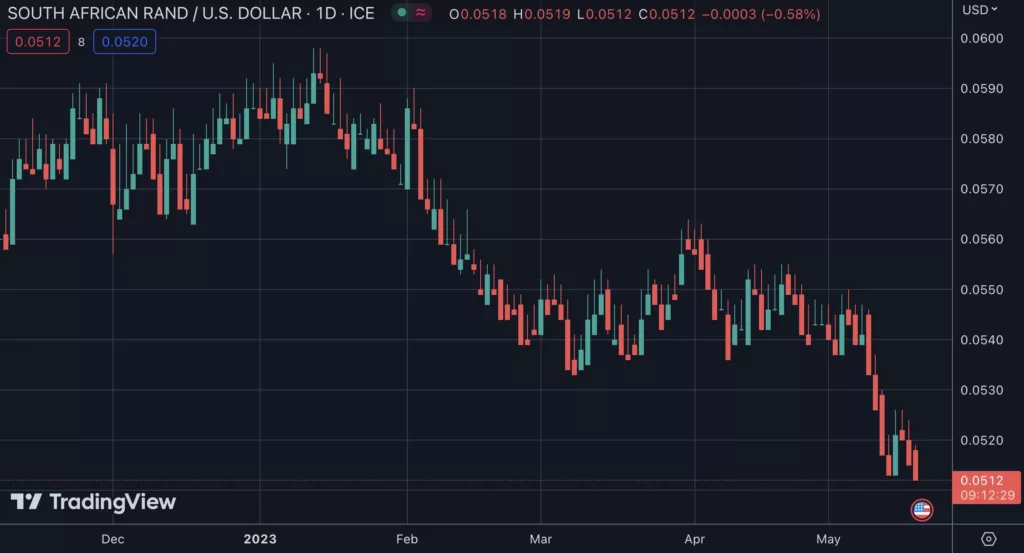
“We aren’t in a good neighbourhood, and are now being thrown into ‘Cold War’ power games to boot. It is time to fret over the rand and the damage its continued depreciation — particularly at this pace — will do to the country,” said another editorial on Mail and Guardian, this time focused on the market.
South Africa has preferential access to the US market through the African Growth and Opportunity Act, which allows specified African nations to export goods duty-free.
An increase in diplomatic tensions may put the economy in jeopardy, with some pointing to comparisons with Turkey.
After Turkey received s-400s from Russia in 2019, the Lira began freefalling with the country now seeing galloping inflation as US imposed some sanctions.
Inflation in South Africa is currently at 7% with their GDP seeing a rollercoaster ride since 2011 to stagnate below that peak of $458 billion to $420 billion for 2022.
The growth rate seems to have structurally lowered in 2015, with the country currently experiencing blackouts due to energy shortages.
BRICS Member
South Africa is to host the BRICS summit in August when another very delicate diplomatic dance faces the nation as speculation continues on whether Russia’s president Vladimir Putin, who is under an arrest warrant by the International Criminal Court (ICC) as a war criminal, will attend.
South Africa is a signatory to ICC and so is legally obliged to arrest him if he attends, but some in South Africa claim the immunity as head of state has not been waved because the warrant was not issued by the UN security council.
In the first meeting of the BRIC signatories held in the Russian city of Yekaterinburg in 2009, India, Brazil, China and Russia declared:
“We believe that there is a strong need for a stable, predictable and more diversified international monetary system…
We underline our support for a… multi-polar world order.”
This is now the explicit Chinese policy with president Xi Jinping stating in Moscow in March that he is in favor of polarization, while Chinese media drums up propaganda about de-dollarization.
As the biggest member of BRICS by far, with all the rest accounting for barely 20% of China’s GDP, they naturally call the shots.
And as both South Africa and Brazil are signatories, then they are knowingly or unknowingly working towards a Chinese world order.
Brazil, South Africa, and India, all three claim they are neutral when India buys tons of oil from Russia, funding its aggression on Ukraine; Brazil gives China cheap propaganda points about dedollarization, while the South African General meets the Russian one.
Nothing is more sensitive than weapon shipments to Russia however. This public statement by US therefore has already affected the Rand and depending on how matters develop further, may affect it more because the characterization of the Defense Minister as petulant may suggest they’re not quite taking the matter seriously.
Relations might not deteriorate further however. South Africa has elections next year and the opposition may well win for the first time in decades.
If they do deteriorate, bitcoin’s adoption in Turkey started taking off in 2019 amid a fall in the lira and a rise in inflation.
South Africa is at a more advanced stage as far as awareness is concerned. If the financial situation deteriorates therefore, as it may do if South Africa keeps working towards polarization, bitcoin’s adoption there might be even more pronounced.
Currently bitcoin appears to have a premium of about $300 on one of South Africa’s crypto exchange VALR, which handles about $8.3 million in spot volumes.
Part of that premium might be due to capital controls in South Africa, which in a deteriorating situation might make dollar access even more difficult.
As a global digital asset, bitcoin is a lot easier to access, and therefore just what happens in these developments may be relevant to this space.
- SEO Powered Content & PR Distribution. Get Amplified Today.
- PlatoAiStream. Web3 Data Intelligence. Knowledge Amplified. Access Here.
- Minting the Future w Adryenn Ashley. Access Here.
- Buy and Sell Shares in PRE-IPO Companies with PREIPO®. Access Here.
- Source: https://www.trustnodes.com/2023/05/18/south-african-rand-gets-wobbly
- :has
- :is
- :not
- $UP
- 2011
- 2015
- 2019
- 2022
- 2023
- a
- About
- above
- Accept
- access
- Accounting
- accuracy
- Act
- actions
- Adoption
- advanced
- affect
- africa
- African
- After
- agreements
- ahead
- All
- Allegations
- allows
- alone
- already
- Ambassador
- Amid
- ammunition
- an
- and
- announced
- Another
- appeared
- ARE
- areas
- Army
- arrest
- AS
- asset
- At
- attend
- AUGUST
- awareness
- back
- BE
- because
- been
- began
- being
- believe
- below
- Bet
- between
- Biggest
- Billion
- Bitcoin
- Black
- both
- Brazil
- brics
- brought
- but
- Buys
- by
- call
- called
- CAN
- capital
- capital controls
- cheap
- chief
- China
- Chinas
- chinese
- chinese media
- City
- claim
- claims
- Coast
- company
- concerned
- confident
- contest
- continued
- continues
- controls
- cooperation
- Council
- countries
- country
- country’s
- Court
- Criminal
- crypto
- crypto exchange
- Currently
- dance
- decades
- December
- dedollarization
- defence
- Defense
- Depending
- develop
- developments
- DID
- difficult
- digital
- Digital Asset
- diversified
- do
- Dollar
- Dont
- down
- drawn
- dropped
- drums
- due
- easier
- economy
- Editorial
- Elections
- energy
- Even
- Every
- everybody
- exchange
- expansion
- experiencing
- export
- faces
- Fall
- far
- favor
- financial
- First
- first time
- focused
- For
- Forces
- from
- funding
- further
- Games
- GDP
- Gen
- General
- gives
- Global
- global digital
- going
- good
- goods
- Ground
- Growth
- guardian
- Handles
- happens
- Have
- he
- head
- Headquarters
- Held
- High
- him
- host
- How
- However
- HTTPS
- i
- if
- immunity
- imposed
- in
- incident
- Increase
- india
- inflation
- inquiry
- International
- into
- Issued
- IT
- ITS
- Jinping
- journey
- just
- Know
- Land
- Last
- Last Year
- left
- Life
- lira
- Lot
- lowered
- made
- make
- March
- Market
- Matter
- Matters
- max-width
- May..
- Media
- meeting
- Meets
- member
- might
- Military
- million
- ministry
- Monday
- Monetary
- more
- Moscow
- my
- nation
- Nations
- naturally
- Near
- Need
- Neutral
- next
- now
- obliged
- october
- of
- off
- Oil
- on
- ONE
- Opportunity
- opposition
- or
- order
- Other
- our
- over
- own
- owned
- Pace
- particularly
- Peak
- piece
- plato
- Plato Data Intelligence
- PlatoData
- points
- policy
- position
- power
- powers
- Predictable
- Premium
- president
- Propaganda
- public
- put
- Putin
- rand
- Rate
- received
- relations
- relevant
- responding
- response
- REST
- Ride
- Rise
- rollercoaster
- Russia
- russian
- Said
- same
- Sanctions
- says
- SEA
- security
- seeing
- seems
- sees
- send
- sensitive
- sent
- shortages
- should
- Signatories
- since
- situation
- So
- some
- Sound
- South
- South Africa
- South African
- south african rand
- Space
- specified
- speculation
- Spot
- stable
- Stage
- started
- State
- stated
- Statement
- Stop
- Storm
- strong
- suggest
- Summit
- supplying
- support
- Switch
- taking
- tell
- tensions
- than
- that
- The
- The West
- their
- then
- There.
- therefore
- These
- they
- this
- three
- Through
- time
- tired
- to
- tons
- towards
- Trustnodes
- Turkey
- Ukraine
- UN
- under
- underline
- us
- us ambassador
- various
- very
- Vessel
- Vladimir Putin
- volumes
- Voyage
- war
- Warrant
- was
- we
- Weapons
- webp
- week
- WELL
- were
- West
- What
- when
- whether
- which
- while
- WHO
- will
- win
- with
- woefully
- working
- world
- xi jinping
- year
- yielded
- you
- zephyrnet






